Military. War. Test.
Viktor MUZHENKO: “There is a factor which the enemy did not take into account. This factor is the Ukrainian character”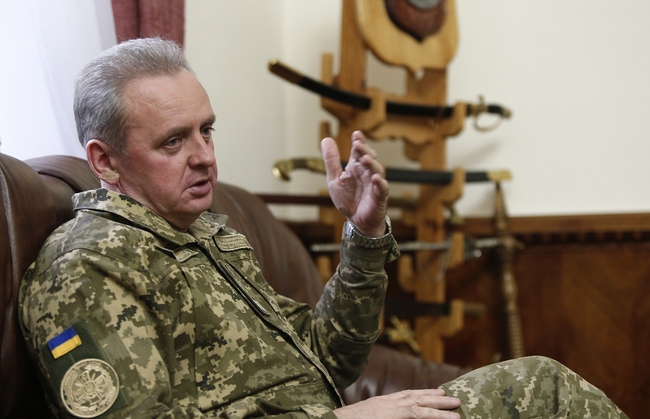
Our meeting with General Viktor Muzhenko took place exactly three years after the Russian aggression started. The spacious corridors of the General Staff, the English language spoken in its rooms, and mostly young faces in them are the first things you notice on entering the building in Povitroflotsky Avenue. That Saturday did not look to be a day of rest for the chief of the General Staff, known by his fellow soldiers as the CGS. His subordinates told us that he had not taken a leave of absence in all these three years. Unfortunately, pages of this newspaper are not spacious enough to print the entirety of an hour-and-a-half-long conversation we had with the man who because of his profession is not prone to lengthy talks.
A military that had been literally in ruins, Russian generals who led the Armed Forces and security services, and total demoralization – these, basically, were the conditions in which Ukraine met the Russian aggression. “We will reach Lviv and run an aspen stake through the heart of this abomination,” I heard from Russian ‘liberators’ in Luhansk. However, the Novorossia plan was stopped in its tracks, as Crimea and parts of the Donbas proved to be the only regions we were unable to defend. Den/The Day’s photographer Ruslan Kaniuka, who accompanied me to the interview, shared the following observation in a direct conversation with officers of the General Staff: “I felt real proud of my country when I saw queues of volunteers forming in military commissariats.”
Photographers, drivers, businessmen, teachers, and even priests – these were the people who took the occupier by the throat and built a barrier of their own bones that put the brakes on the aggressor’s advance. Thanks to them, the military got revived ahead of schedule, despite the fact that the enemy was doing its evil work not only on the frontlines, but also in our rear areas. Populists, demagogues, and outright traitors who never leave the studios of our central TV channels – this camarilla tries to dilute the Ukrainians’ morale. However, the recent events in the Donbas, when the enemy began again to step up the tempo of the aggression, proved that our regular troops and volunteers would never hesitate to respond in kind. Meanwhile, we will not forget how Ukraine was bleeding (and continues to bleed, even if not as badly): Ilovaisk, Debaltseve, the Donetsk and Luhansk airports, Savur-Mohyla, Zelenopillia – these names throb with the pain of our losses. The abandoned cities of Donetsk and Luhansk, which were mere days and kilometers from liberation in the summer of 2014, and lost Crimea – our national interests will never be satisfied until these lands are back in Ukrainian hands.
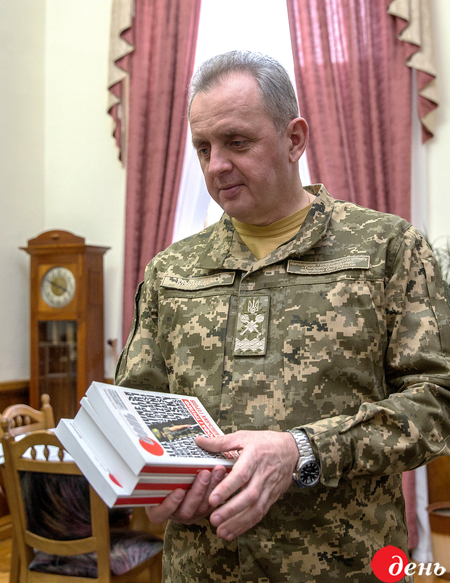
These issues and more are covered in the interview with the Chief of the General Staff and Commander-in-Chief of the Ukrainian Armed Forces Viktor Muzhenko, which is offered below.
“THOSE WHO BELIEVE THAT THE UKRAINIAN MILITARY BEHAVED PASSIVELY IN 2014 ARE MISTAKEN”
After the Russian aggression, which came totally unexpected for most, the Ukrainians were able to organize and offer active resistance to the enemy. But most importantly, we have learned who is who: who are our brothers and family members, and who are our enemies and traitors. What did make the most lasting impression on you in these three years?
“Yes. The war swept through our lives like a sword. It also has divided people not just into patriots and non-patriots, but also into those who capitulated, got disoriented under the pressure of provocations, and those who, conversely, were able to adequately assess the situation. The latter are our assets.
“What do I remember best? The start of the Russian aggression was a time when illusions died... I even know cases of families who split over attitudes to this war. For me, the telling moment came in March 2014. It became clear then who was who... Crimea became a litmus test. After all, sad as it is to admit, 70 percent of our soldiers there got disoriented and stayed in Crimea thus choosing the side of the occupier. Was it not a dignity test?
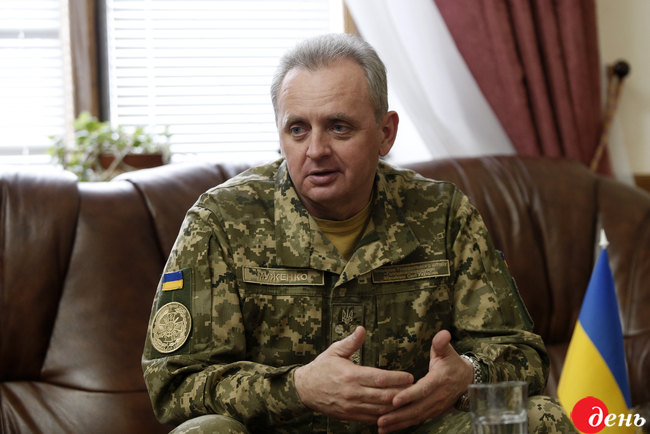
“Year 2014 was for me a continuous kaleidoscope of events. I remember how it all began, already after the Euromaidan and the massacres in Kyiv... I was part of a Ukrainian delegation and, together with the first deputy minister of defense of Ukraine, participated in a meeting at the headquarters of NATO. We arrived in Brussels late on February 26, and very early on February 27, our military representative to the North Atlantic Alliance knocked at my door and informed that the Russians were moving on Crimea!
“Next, I remember my time in the Kherson region. I was then a deputy chief of the General Staff and had orders to form a force which would protect our southern regions... I and my group of officers worked for 20 hours a day, spending 5 to 6 hours daily in a helicopter. I got ‘greetings’ from the other side as well: ‘Tell Muzhenko that we are monitoring him...’
“‘And we are monitoring you,’ I replied. Incidentally, the first combat contact with the Russians took place at that time, as lads from one of our special operations regiments clashed with a Russian sabotage and intelligence team that entered mainland Ukraine.
“It happens sometimes that I can remember in detail the day when an event happened, but cannot remember what day it was. This is a subjective perception, coming from a continuous kaleidoscope of events. It was the terrible year 2014. The situation was changing every minute, until such time as the line of contact got more or less defined and the situation became relatively static, which happened at some point in November that year.
“The next thing I remember very well is the May 26, 2014 battle for the Donetsk Airport. It was a turning point. We could either passively observe it being captured, or take decisive action to protect that facility. A three-day battle resulted in the Ukrainian troops clearing the Donetsk Airport so thoroughly that the enemy did not dare to storm it again for a few months. This is despite the airport being completely encircled until mid-July 2014 or so. This is very telling. The heroism and fortitude of Ukrainian troops in the airport is a special page of our contemporary history.”
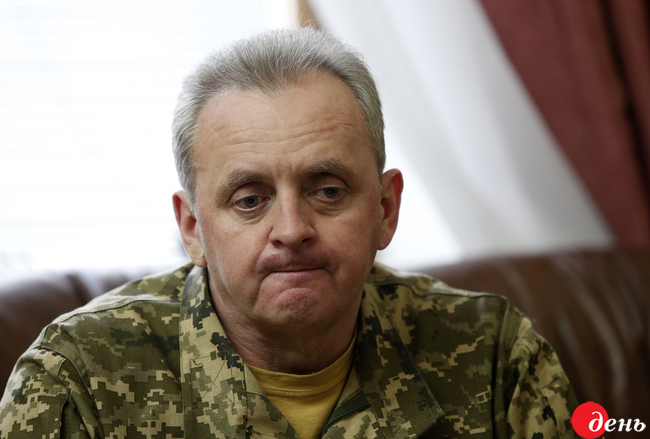
You had previous combat experience, including that obtained in the Iraq War. Still, did the experience of war fighting in Ukraine destroy some stereotypes in your views of war?
“The stereotypes do not really matter. In Iraq, I did not feel that the war was being fought at home. This is a completely different perspective. When the war started in Ukraine, that sword wounded me personally. Accordingly, the assessment of the situation was painful. It generated determination of an absolute and unquestioned kind. We understood that we had either to act or passively observe it all and lose. Those who believe that the Ukrainian military behaved passively in 2014 are mistaken. On the contrary, it was in 2014 that the Ukrainian military managed to organize its actions and strike the enemy where it expected to win easily. This was all done by Ukrainian lads, these soldiers whom I have the honor to command and who I will always be proud of.”
What good did the Iraq experience do you?
“That experience made me, just as other soldiers who were there, able to adapt to stress quicker. The tragedy was playing out on our land. We had to adapt quickly and make decisions about protecting the country. It was an extremely difficult and massive array of tasks that could not be delayed.”
Did the Iraq veterans find a use in the Russian-Ukrainian war?
“They did. I was part of the 95th Brigade in Iraq. I can tell you that when the Russian-Ukrainian war started, many of the Iraq campaign veterans even used their old noms de guerre. For example, one of battalion commanders had ‘Al-Kut’ for his nom de guerre. Participation in operations in Iraq made it possible to have professionally and psychologically well-prepared fighters who then came to the defense of the homeland at a critical moment. This is a fact. This experience was valuable for us.”
“OCCUPATION OF CRIMEA AND PARTS OF THE DONBAS CONSTITUTED A STRATEGIC ERROR ON RUSSIA’S PART”
Many people criticized the government of Ukraine then, asking why we went into Iraq...
“Of course, the then national leadership’s position was crucial at that time, in 2003. We implemented its decisions. The military should protect the interests of the nation. If someone thinks that the military is a formality, they do not understand the basics of statecraft. We have all seen that war is not a section of a history textbook. This is a real danger bringing real losses.”
But we were not ready for it...
“Yes, but there is a factor which the enemy did not take into account. This factor is the Ukrainian character.”
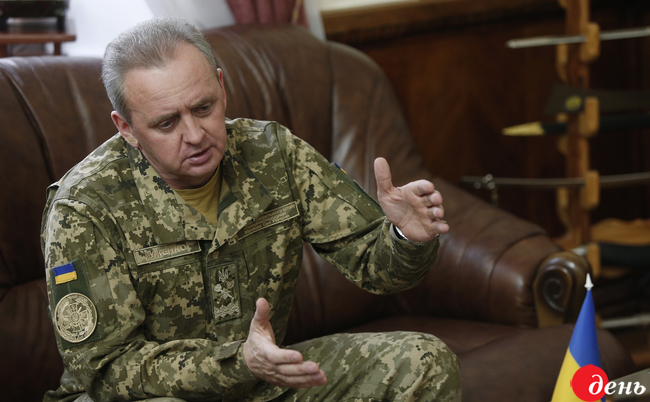
Even though we were positioning ourselves as a peaceful nation.
“Which we are. But in a time of danger, the Ukrainian nation became an indestructible monolith. This greatly surprised the enemy who wanted us to repeat mistakes of the past. Our mentality has changed, and I want to stress this! The true patriots of Ukraine are those who are now in army to protect it from the Russian aggression. We did not attack anyone. We did not take foreign lands. However, the occupation of Crimea and parts of the Donbas constituted a strategic error on Russia’s part. This should not have been done, even from a perspective of imperial ambitions. Today, it is as if we have woken up from the lethargic sleep of the so-called peoples’ friendship in which we sincerely believed until recently. Anyway, the Ukrainian soldiers who had gone through Iraq and other missions were to some extent the basis for the defensive core created in 2014.”
General, can it be that we are dealing here with the phenomenon of the Ukrainians’ inherent capacity for mobilizing to defend their country? We know about the plans of the aggressor to occupy at least eight regions. That is, Russia assumed that it would march through Ukraine just as easily as the Nazis believed they would march through the Slavic lands.
“However, their hopes came to naught. And the Nazi analogy is quite appropriate here. As a general rule, attacking Rus’ does not pay. I would like to emphasize that I have just mentioned Rus’, not Russia or Muscovy. This is the foundation of our defense capabilities. By our very nature, we cannot bend the knee. We are a nation of warriors. By the way, at the very beginning of the anti-terrorist operation (ATO), the bulk of its operational headquarters was made up of soldiers who served in the Eighth Army Corps, which was saved from disbanding in 2013 due to fierce resistance within the Armed Forces.”
“THOSE WHO WERE THE FIRST TO GO INTO BATTLE BECAME THE SEED FROM WHICH THE MODERN UKRAINIAN ARMED FORCES ARE EMERGING”
However, we had our military greatly deteriorated. Moreover, any ability whatsoever to resist the enemy was being eliminated, and we were being told that the enemy itself was a “friend.”
“It lasted for decades. First our peacefulness and later the enemy’s planned action were gradually destroying our military. Apparently, they were really preparing us for surrender. I can say that we still woke up when the time was up. Also, the destructive work affected not only the military, but all institutions of the state. The goal of the aggressor was to turn Ukraine into an amorphous state entity which would be unable to protect itself. Interestingly, before the war even the military-administrative division of the territory of Ukraine was set up so that the area of responsibility of one of the two operational commands almost coincided with the boundaries of the project which is commonly called the Novorossia plan. Effectively, they were laying the groundwork for two self-sufficient military formations that might become opposing armies someday.
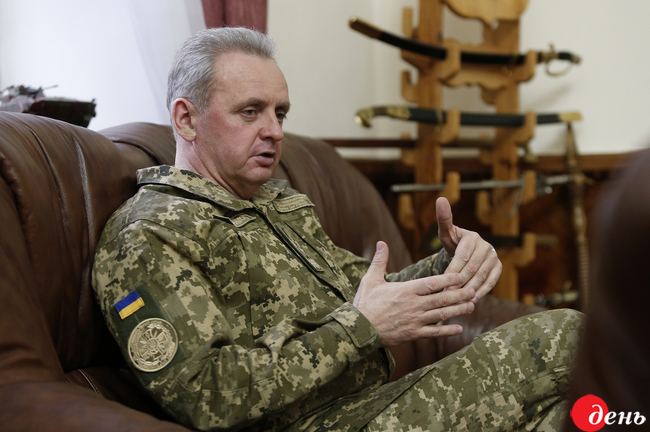
“Still, we survived. And those who were the first to go into battle became the seed from which the modern Ukrainian Armed Forces are emerging. I will be frank: what took some countries decades, we did in three years. One would do well to look at capabilities of our defense industry, which is beginning to revive. The war stimulated the development of new armament types, both lethal and non-lethal in nature. We have seen rapid development in certain fields, including unmanned aircraft systems. Now even civilian volunteers are trying to offer their own interesting designs, and while they are inferior to Western counterparts, it still marks a new stage for us.”
David Ben-Gurion once said that “the military is a school of civic formation.” How do you think, what should be the ratio between professional soldiers and mobilized conscripts in the military?
“The idea of professional military presupposes professionals. How these professionals are to be recruited is another matter. The Ukrainian law clearly defines the ratio of the civilian and military components. However, I wish to emphasize again that the Armed Forces is more than just some ratio of military to civilians. Our goal is for every citizen to feel responsibility for the defense of the nation, and bearing arms is not the only way to do it. As for the military draft, I am convinced that it is needed. We need a trained reserve. And I know that our young men will like their time in the Ukrainian military. They will be proud of it.
“In addition, service in the contemporary Ukrainian military provides a framework for efficient formation of good citizen’s worldview. No school of patriotism is better than the military. The military educates people to be not only citizens but also warriors. Napoleon once said that ‘conscription is the vitality of a nation, the purification of its morality, and the real foundations of all its habits.’
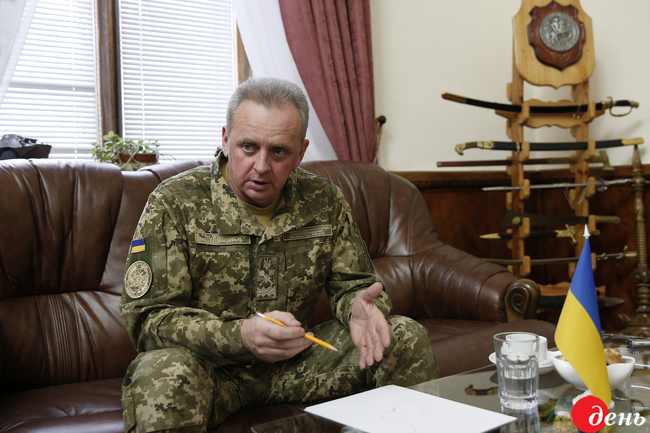
“We have sizable reserves now, which at any time may join the defense of the nation. And it is not just manpower, as it was before. I would like to stress that these are professionally trained reserves. Yes, fighting entails losses. It is objective reality, and we must be ready for it. But our experience of the past three years suggests that the Ukrainians are able to fight with quality, not numbers. Of course, our emphasis is on professional soldiers as the basis of the military, because we strive for maximum efficiency. We all, from soldier to general, are professionals. But signing the contract is not a formality, as it signifies professionalism and motivation. I have always explained to people that our contracts are not measured in money, as freedom and happiness of our people are priceless. Today, I am more optimistic than ever about the future of our military.”
“WE ARE PASSING OUR ACCELERATED EXAM WITH ‘A’ MARKS”
Before the Russian aggression started, they began to create special operations forces (SOF), even envisaging their activities as not confined to the borders of Russia. They planned for expansion. What is the present condition of this branch of our forces?
“The Ukrainian SOF were created a year and a half ago and have already begun to perform tasks in the ATO area. We have established the SOF Command which manages these units. We have a dedicated training center for the SOF and provide appropriate training and supplies to this personnel. Thus, the work is going on...”
I understand that the SOF is not limited to the gun-toting lads in camouflage... there are other specialists there. What is their present condition?
“We are working on it. I can say that everything is going according to the plan. Surprisingly as it may sound, we are passing our accelerated exam with ‘A’ marks. We do not have decades to work on it. This kind of time is just unavailable. We are working in conditions offered by our reality. The SOF need specific weapons and equipment. We cannot afford the costly equipment which the US SOF soldiers are provided with. We should base our demands on realities. However, do you see this military which has been resisting aggression for three years under barrages of Grad rockets? Moreover, it has been successful as well! I would like Ukrainians to understand that the nation has awakened. Children and youths who come to the military installations on their own just to sing songs on festive days are our most valuable assets. I am sure that in a few years, they will stand side-by-side with these soldiers who will become their brothers-in-arms. We are working daily on rearmament, our talented engineers are working on new designs, but the most important thing is our people who thank us in every village where the Ukrainian army holds the line.”
I can only confirm this, because I saw with my own eyes that schoolchildren from Popasna have a lot of respect for Ukrainian soldiers.
“Lyrical stories apart, the Ukrainian military have combat experience. This factor is often decisive in military affairs. We are on our own land, which we are defending with our own blood. Given that the Kremlin has been asserting that we are fighting ‘combine operators,’ I will say that on the contrary, real Ukrainian combine operators have taken up arms to defend our land from Russia. And these Ukrainian combine operators already have lessons to teach which foreign militaries are eager to learn. Yes, we need help, but we are a real force already. We maintain cooperation with colleagues from other countries. This is not only useful from a practical point of view, but is morally inspiring and supportive for the Ukrainian soldiers as well.”
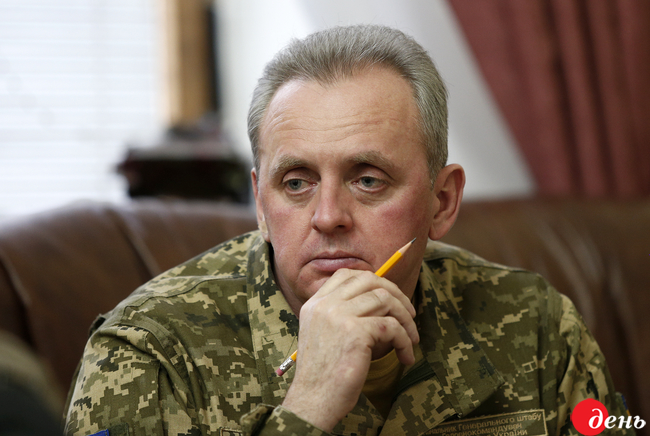
We actually hold the line for Europe as we are resisting the Russian aggression.
“Of course. The Ukrainian Armed Forces perform extremely important tasks and make a special contribution to European security. Today, we pay attention to the development of all military branches and services. It is not easy in wartime, but we have had major successes in many areas. The list of tasks facing the modern Ukrainian Armed Forces is much longer and more complex than the average citizen can imagine. Forms and methods of using troops are also increasingly complex. I can say one thing: we are seriously preparing for different scenarios, including a full-scale aggression by the Russian side.”
“TANKS AND GRAD ROCKET LAUNCHERS SHELL LOCATIONS WHICH WERE PREPARED IN ADVANCE BY MEDIA BOMBARDMENT”
Russia used its SOF on foreign soil. Do we anticipate some way of, so to speak, exporting our national and military interests?
“We consider all aspects of a possible Russian attack. Current risks are not limited to the establishment of the so-called corridor linking the occupied Donbas to occupied Crimea. We are seriously preparing to protect every corner of our country. The work is ongoing on asymmetric response to the enemy in the case of it implementing its aggressive plans. The whole country, including the Armed Forces, is experiencing fierce informational pressure at the moment. Tanks and Grad rocket launchers shell locations which were prepared in advance by media bombardment. The Ukrainians are a peaceful nation. But this does not mean that we should not project our perspective, which we have every historic right to. As to your question about the possibility of using the SOF in other areas, I can say that the Ukrainian law provides for such a possibility. Again, Ukraine is a completely peaceful nation that does not want to interfere in the affairs of other countries. Still, Ukraine is doing everything to ensure its security, and we have a whole array of means available for this purpose. Let me say it in militarese: we are working across the entire depth of tactical and strategic structure.”
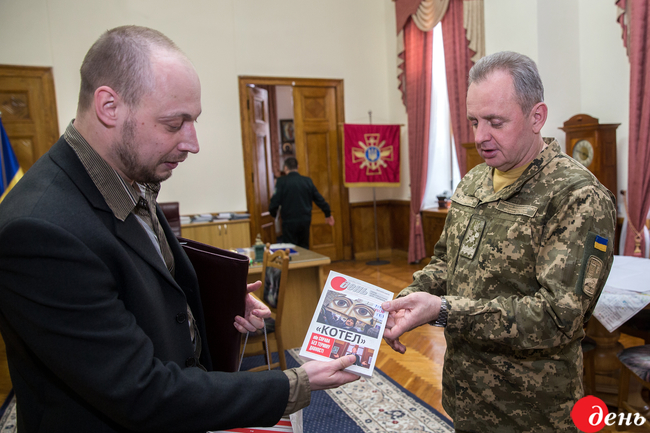
Minister of Defense of the Russian Federation Sergey Shoigu said recently he intended to create information warfare forces. This effectively means a declaration of war in information space, which was conducted unofficially before. Can we respond in kind?
“In this regard, there are serious issues with our media. Of course, we are working in this sector. But our media have to act responsibly as well. Not all media have realized that certain news messages play into the hands of the enemy.”
However, politicians play a negative role as well. By the way, were there any instances of politicians trying to trip you up? For example, I know you were working on withdrawing our lads from the Luhansk Airport when the Ilovaisk tragedy began... And, unlike Ilovaisk, the Luhansk operation was successful.
“I can say that the events around the Luhansk Airport did not get major media coverage, and it helped us to successfully carry out the operation. Turning now to Ilovaisk, the General Staff made a detailed analysis of these events. These materials are available to anyone who really wants to understand the causes of the tragedy. Time will put everything in its place.”
Were you hampered by politicians?
“Let us just say that we did have a problem with some politicians or people close to them attempting to influence the conduct of operations. I can say that, for example, when we were preparing the withdrawal from Debaltseve, the plan of it quickly appeared on the Facebook page of Semen Semenchenko (Hrishyn)...”
Do you think that it was done intentionally?
“I would like to hope that politicians did it unintentionally. Still, I do not know how the plan of the withdrawal from Debaltseve made it to Semenchenko... Speaking of Debaltseve, I can say that regular units of the Russian army faced there stubborn, well-organized defense put up by Ukrainian units, including the 128th Separate Mountain Infantry Brigade. Yes, not all were able to hold their ground... At the same time, we managed, despite extremely difficult conditions, to preserve command and control of the troops, who were not only being fired on by the enemy, but also suffering from violent impact of information spouted by fake ‘experts’ who tried to sow panic. Due to our soldiers’ fortitude and accurate implementation of the operational plan, we managed to avoid panic, to confuse the enemy, and to organize planned withdrawal of troops to well-defended positions.”
When President Petro Poroshenko allegedly left the Minsk negotiations to talk on the phone, he talked with you, did not he?
“Yes, I talked with the president, and the Russians were surprised that the Ukrainian forces were not actually encircled. The Russians tried to convince everyone in Minsk that our troops were again in the pocket. To do this, they concentrated strong reserves near Debaltseve. The president invited me to fly to Minsk and to report to him on the situation, but I explained that maintaining command and control from Minsk would be extremely difficult. I also had a phone call with the Russian General Staff’s general Andrey Kartapolov. He contacted me and insisted that our troops were fully encircled. I offered to meet him in Debaltseve. He refused. At the time, it fundamentally changed our diplomatic position at the talks in Minsk.
“Indeed, had we began to retreat immediately, as expected by the Russians, the tragedy of Ilovaisk could have been repeated, since Russian artillery would have shelled us from both sides of the corridor. However, the fortitude and good order shown by our forces near Debaltseve forced the enemy to concentrate artillery on the city itself and its vicinity. Few people know that the enemy spent a whole day shelling Debaltseve with all kinds of ammunition after we withdrew most of our columns from that ‘appendix.’”
I want to ask you another question as a former resident of Luhansk. Was it possible, after all, to liberate Luhansk and Donetsk in 2014?
“Speaking of Luhansk, I must say that this was a real possibility. We had to consolidate our position in Kamianyi Brid, which was the commanding height above the city. Unfortunately, there were negative factors in play, including the Ilovaisk events. Again, war is an activity requiring precise coordination and professionalism. There were many factors that hindered us more than helped in 2014.”
We met past May in a plane on the way to the NATO headquarters. Why the Law “On the Fundamentals of National Security of Ukraine” establishes as our ultimate goal attaining the NATO standards instead of joining the Alliance? To be more precise, it says we need “to deepen cooperation with NATO in order to attain the criteria required for membership in that organization.” Is making NATO accession an objective being resisted by some senior military officials who see it as just another headache?
“We do have indeed an ambitious goal, which is to achieve these criteria by 2020. Any reform is primarily about changing the minds of people who implement it. We are witnessing a new generation of commanders emerging at all levels, from platoon to brigade and above. They are the driving force that is changing the shape of the Ukrainian military at the moment. Modern Ukrainian commanders are practical-minded people who understand better than anyone else that in order to win one must constantly learn and acquire new capabilities. We have no time for slow starts. We have our objective defined, and we will do everything to meet it.”
***
Of course, some parts of our conversation with Muzhenko did not make it to the pages of The Day. “Left out” bits will be published at some point in the future... Following the interview, we presented the chief of the General Staff with the trilogy from Den’s Library (“The Trap”; I, an Eyewitness; Catastrophe and Triumph), which deals with contemporary history of Ukraine and the culmination of the tragic events in which Muzhenko had to take part directly.
Newspaper output №:
№17, (2017)Section
Topic of the Day





